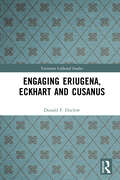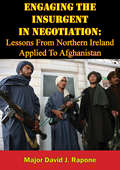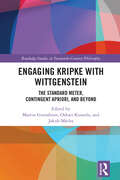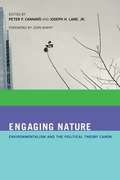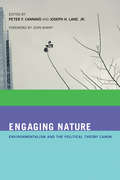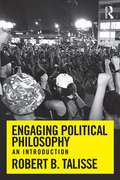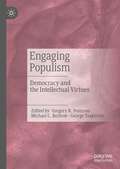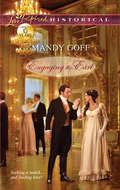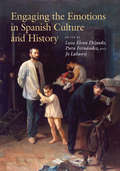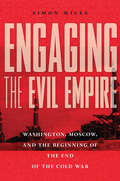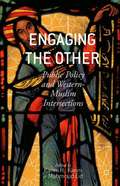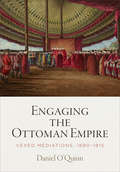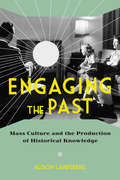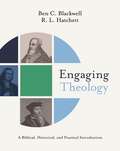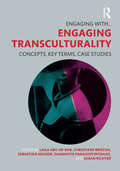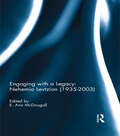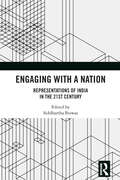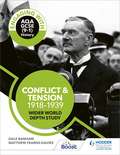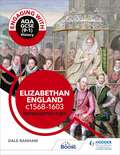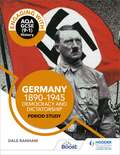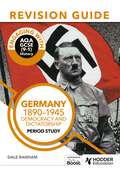- Table View
- List View
Engaging Eriugena, Eckhart and Cusanus (Variorum Collected Studies)
by Donald F. DuclowEngaging Eriugena, Eckhart and Cusanus contains two new essays and nine others published between 2005 and 2019. The essays explore Eriugena, Eckhart and Cusanus as bold thinkers deeply engaged with their times and culture. John Scottus Eriugena, Meister Eckhart and Nicholas of Cusa are key figures in the medieval Christian Neoplatonic tradition. This book focuses on their engagement with practical, experiential issues and controversies. Eriugena revises Genesis’ Adam and Eve narrative and makes sexual difference and overcoming it central to his Periphyseon. Eckhart’s Annunciation sermons urge his hearers to give birth to God’s son within their lives, and he develops a distinctive approach to pain and suffering. His radical preaching on the Eucharist and mystical union was judged heretical but was later taken up by Nicholas of Cusa. Coins and banking became key symbols in Cusanus’ exploration of humanity as created in God’s image, and he used mechanical clocks in reflecting on time and eternity. "Engagement" also describes these thinkers’ reception of their predecessors and how later readers appropriated their works. Eriugena struggled with the legacy of Augustine and the Greek Fathers. Eckhart’s theology of suffering provoked varied responses from his students Henry Suso, Johannes Tauler and the twentieth-century therapist Ursula Fleming. Cusanus provides the volume’s lynchpin as two articles analyse his reading of Eriugena and Eckhart, and a third discusses how he deftly countered Johannes Wenck’s accusations of heresy. The book will be of interest to students of Medieval Philosophy, Theology, Spirituality and their place within Cultural History.
Engaging The Insurgent In Negotiation: Lessons From Northern Ireland Applied To Afghanistan
by Major David J. RaponeOutreach, negotiation and cooption may be a vital tool for counterinsurgencies as they transform conflict and facilitate Amnesty, Reconciliation and Reintegration (AR2) of warring elements within a war-torn society. This monograph utilizes a two-system comparison between the Taliban and the Irish Republican Army (IRA) to inquire if the Taliban are willing to participate in fruitful dialogue to initiate AR2. The suggestion for adopting a Northern Ireland approach for negotiation is compelling due to the strategic similarities the Taliban and the IRA share. The similarities, however, are the underlying reason why the Taliban will not be amenable to compromise within the short-term context compelled by the United States current strategy.What emerged is that the Taliban is reacting to changing environmental stimuli in the same manner as the PIRA. The direct consequence of this similarity is the likelihood of negotiations and outreach to take hold. The Taliban in 2010, like their IRA counterparts in 1972, believe they have a comparative advantage over their counterparts and are not willing to compromise their ideological convictions. Thus, policy makers in Washington, London, and Kabul should cool their rhetoric surrounding negotiation and dampen expectations that talks with the Taliban will yield significant results.
Engaging Kripke with Wittgenstein: The Standard Meter, Contingent Apriori, and Beyond (Routledge Studies in Twentieth-Century Philosophy)
by Martin Gustafsson Oskari Kuusela Jakub MáchaThis volume draws connections between Wittgenstein's philosophy and the work of Saul Kripke, especially his Naming and Necessity. Saul Kripke is regarded as one of the foremost representatives of contemporary analytic philosophy. His most important contributions include the strict distinction between metaphysical and epistemological questions, the introduction of the notions of contingent a priori truth and necessary a posteriori truth, and original accounts of names, descriptions, identity, necessity, and realism. The chapters in this book elucidate the relevant connections between Kripke’s work and Wittgenstein, specifically concerning the standard meter, contingent apriori, and rule-following. The contributions shed light on how Kripke’s philosophical outlook was influenced by Wittgenstein, and how mainstream analytic philosophy and Wittgensteinian philosophy can fruitfully engage with one another. Engaging Kripke with Wittgenstein will be of interest to philosophers working on Wittgenstein, Kripke, and the history of analytic philosophy.
Engaging Nature
by Peter F. Cannavò John Barry Joseph H. Lane Jr.Contemporary environmental political theory considers the implications of the environmental crisis for such political concepts as rights, citizenship, justice, democracy, the state, race, class, and gender. As the field has matured, scholars have begun to explore connections between Green Theory and such canonical political thinkers as Plato, Machiavelli, Locke, and Marx. The essays in this volume put important figures from the political theory canon in dialogue with current environmental political theory. It is the first comprehensive volume to bring the insights of Green Theory to bear in reinterpreting these canonical theorists.Individual essays cover such classical figures in Western thought as Aristotle, Hume, Rousseau, Mill, and Burke, but they also depart from the traditional canon to consider Mary Wollstonecraft, W. E. B. Du Bois, Hannah Arendt, and Confucius. Engaging and accessible, the essays also offer original and innovative interpretations that often challenge standard readings of these thinkers. In examining and explicating how these great thinkers of the past viewed the natural world and our relationship with nature, the essays also illuminate our current environmental predicament.Essays onPlato Aristotle Niccolò Machiavelli Thomas Hobbes John Locke David Hume Jean-Jacques Rousseau Edmund Burke Mary Wollstonecraft John Stuart Mill Karl Marx W. E. B. Du Bois Martin Heidegger Hannah Arendt Confucius ContributorsSheryl D. Breen, W. Scott Cameron, Peter F. Cannavò, Joel Jay Kassiola, Joseph H. Lane Jr. Timothy W. Luke, John M. Meyer, Özgüç Orhan, Barbara K. Seeber, Francisco Seijo, Kimberly K. Smith, Piers H. G. Stephens, Zev Trachtenberg, Andrew Valls, Harlan Wilson
Engaging Nature: Environmentalism and the Political Theory Canon (The\mit Press Ser.)
by Jr. Lane Peter F. Cannavò John Barry Joseph H.Essays that put noted political thinkers of the past—including Plato, Machiavelli, Hobbes, Wollstonecraft, Marx, and Confucius—in dialogue with current environmental political theory.Contemporary environmental political theory considers the implications of the environmental crisis for such political concepts as rights, citizenship, justice, democracy, the state, race, class, and gender. As the field has matured, scholars have begun to explore connections between Green Theory and such canonical political thinkers as Plato, Machiavelli, Locke, and Marx. The essays in this volume put important figures from the political theory canon in dialogue with current environmental political theory. It is the first comprehensive volume to bring the insights of Green Theory to bear in reinterpreting these canonical theorists.Individual essays cover such classical figures in Western thought as Aristotle, Hume, Rousseau, Mill, and Burke, but they also depart from the traditional canon to consider Mary Wollstonecraft, W. E. B. Du Bois, Hannah Arendt, and Confucius. Engaging and accessible, the essays also offer original and innovative interpretations that often challenge standard readings of these thinkers. In examining and explicating how these great thinkers of the past viewed the natural world and our relationship with nature, the essays also illuminate our current environmental predicament.Essays onPlato • Aristotle • Niccolò Machiavelli • Thomas Hobbes • John Locke • David Hume • Jean-Jacques Rousseau • Edmund Burke • Mary Wollstonecraft • John Stuart Mill • Karl Marx • W. E. B. Du Bois • Martin Heidegger • Hannah Arendt • Confucius ContributorsSheryl D. Breen, W. Scott Cameron, Peter F. Cannavò, Joel Jay Kassiola, Joseph H. Lane Jr. Timothy W. Luke, John M. Meyer, Özgüç Orhan, Barbara K. Seeber, Francisco Seijo, Kimberly K. Smith, Piers H. G. Stephens, Zev Trachtenberg, Andrew Valls, Harlan Wilson
Engaging Political Philosophy: An Introduction
by Robert B. TalisseEngaging Political Philosophy introduces readers to the central problems of political philosophy. Presuming no prior work in the area, the book explores the fundamental philosophical questions regarding freedom, authority, justice, and democracy. More than a survey of the central figures and texts, Engaging Political Philosophy takes readers on a philosophical exploration of the core of the field, directly examining the arguments and concepts that drive the contemporary debates. Thus the fundamental issues of political philosophy are encountered first-hand, rather than through intermediary summaries of the major texts and theories. As a result, readers are introduced to political philosophy by doing philosophy. Written in a conversational style, Engaging Political Philosophy is accessible to students and general readers. Instructors can use it in the classroom as a stand-alone textbook, a complement to a standard collection of historical readings, or as a primer to be studied in preparation for contemporary readings.
Engaging Populism: Democracy and the Intellectual Virtues
by Gregory R. Peterson Michael C. Berhow George TsakiridisThe past two decades have witnessed an intensifying rise of populist movements globally, and their impact has been felt in both more and less developed countries. Engaging Populism: Democracy and the Intellectual Virtues approaches populism from the perspective of work on the intellectual virtues, including contributions from philosophy, history, religious studies, political psychology, and law. Although recent decades have seen a significant advance in philosophical reflection on intellectual virtues and vices, less effort has been made to date to apply this work to the political realm. While every political movement suffers from various biases, contemporary populism’s association with anti-science attitudes and conspiracy theories makes it a potentially rich subject of reflection concerning the role of intellectual virtues in public life. Interdisciplinary in approach, Engaging Populism will be of interest to scholars and students in philosophy, political theory, psychology, and related fields in the humanities and social sciences.
Engaging the Earl
by Mandy GoffTo help her destitute parents, Emma Mercer must marry very well. And very soon. Love is irrelevant. Only security matters...doesn't it? Aided by her friend Olivia-and Olivia's brother Marcus, Earl of Westin-Emma quickly gains society's notice. But Marcus himself, the only man whose company Emma truly enjoys, seems oblivious to her charms.With his finances in jeopardy, Marcus knows he can't be the wealthy groom Emma needs. Instead, he'll see her properly engaged to the right man...and break his own heart.Yet Emma's determination and Marcus's resolve may be no match for love, faith-and a scheming sister determined to end Emma's husband hunt right at Marcus's side.
Engaging the Emotions in Spanish Culture and History
by Jo Labanyi Luisa Elena Delgado Pura FernandezRather than being properties of the individual self, emotions are socially produced and deployed in specific cultural contexts, as this collection documents with unusual richness. All the essays show emotions to be a form of thought and knowledge, and a major component of social life—including in the nineteenth century, which attempted to relegate them to a feminine intimate sphere.The collection ranges across topics such as eighteenth-century sensibility, nineteenth-century concerns with the transmission of emotions, early twentieth-century cinematic affect, and the contemporary mobilization of political emotions including those regarding nonstate national identities. The complexities and effects of emotions are explored in a variety of forms—political rhetoric, literature, personal letters, medical writing, cinema, graphic art, soap opera, journalism, popular music, digital media—with attention paid to broader European and transatlantic implications.
Engaging the Emotions in Spanish Culture and History
by Luisa Elena Delgado, Pura Fernández, and Jo LabanyiRather than being properties of the individual self, emotions are socially produced and deployed in specific cultural contexts, as this collection documents with unusual richness. All the essays show emotions to be a form of thought and knowledge, and a major component of social life—including in the nineteenth century, which attempted to relegate them to a feminine intimate sphere. The collection ranges across topics such as eighteenth-century sensibility, nineteenth-century concerns with the transmission of emotions, early twentieth-century cinematic affect, and the contemporary mobilization of political emotions including those regarding nonstate national identities. The complexities and effects of emotions are explored in a variety of forms—political rhetoric, literature, personal letters, medical writing, cinema, graphic art, soap opera, journalism, popular music, digital media—with attention paid to broader European and transatlantic implications.
Engaging the Evil Empire: Washington, Moscow, and the Beginning of the End of the Cold War
by Simon MilesIn a narrative-redefining approach, Engaging the Evil Empire dramatically alters how we look at the beginning of the end of the Cold War. Tracking key events in US-Soviet relations across the years between 1980 and 1985, Simon Miles shows that covert engagement gave way to overt conversation as both superpowers determined that open diplomacy was the best means of furthering their own, primarily competitive, goals. Miles narrates the history of these dramatic years, as President Ronald Reagan consistently applied a disciplined carrot-and-stick approach, reaching out to Moscow while at the same time excoriating the Soviet system and building up US military capabilities.The received wisdom in diplomatic circles is that the beginning of the end of the Cold War came from changing policy preferences and that President Reagan in particular opted for a more conciliatory and less bellicose diplomatic approach. In reality, Miles clearly demonstrates, Reagan and ranking officials in the National Security Council had determined that the United States enjoyed a strategic margin of error that permitted it to engage Moscow overtly.As US grand strategy developed, so did that of the Soviet Union. Engaging the Evil Empire covers five critical years of Cold War history when Soviet leaders tried to reduce tensions between the two nations in order to gain economic breathing room and, to ensure domestic political stability, prioritize expenditures on butter over those on guns. Miles's bold narrative shifts the focus of Cold War historians away from exclusive attention on Washington by focusing on the years of back-channel communiqués and internal strategy debates in Moscow as well as Prague and East Berlin.
Engaging the Other
by Karim H. Karim Mahmoud EidAddressing the specific contexts of communal leadership, educational policy, inter-communal relations, legal reform, media production, public discourse, public opinion, and responses to government policy, this volume examines Western-Muslim relations and makes proposals for enhancing Self-Other interaction to improve societal harmony.
Engaging the Ottoman Empire: Vexed Mediations, 1690-1815 (Material Texts)
by Daniel O'QuinnDaniel O'Quinn investigates the complex interpersonal, political, and aesthetic relationships between Europeans and Ottomans in the long eighteenth century. Bookmarking his analysis with the conflict leading to the 1699 Treaty of Karlowitz on one end and the 1815 bid for Greek independence on the other, he follows the fortunes of notable British, Dutch, and French diplomats to the Sublime Porte of the Ottoman Empire as they lived and worked according to the capitulations surrendered to the Sultan.Closely reading a mixed archive of drawings, maps, letters, dispatches, memoirs, travel narratives, engraved books, paintings, poems, and architecture, O'Quinn demonstrates the extent to which the Ottoman state was not only the subject of historical curiosity in Europe but also a key foil against which Western theories of governance were articulated. Juxtaposing narrative accounts of diplomatic life in Constantinople, such as those contained in the letters of Lady Mary Wortley Montagu, wife of the English ambassador, with visual depictions such as those of the costumes of the Ottoman elite produced by the French-Flemish painter Jean Baptiste Vanmour, he traces the dissemination of European representations and interpretations of the Ottoman Empire throughout eighteenth-century material culture.In a series of eight interlocking chapters, O'Quinn presents sustained and detailed case studies of particular objects, personalities, and historical contexts, framing intercultural encounters between East and West through a set of key concerns: translation, mediation, sociability, and hospitality. Richly illustrated and provocatively argued, Engaging the Ottoman Empire demonstrates that study of the Ottoman world is vital to understanding European modernity.
Engaging the Past
by Alison LandsbergReading films, television dramas, reality shows, and virtual exhibits, among other popular texts, Engaging the Past examines the making and meaning of history for everyday viewers. Contemporary media can encourage complex interactions with the past that have far-reaching consequences for history and politics. Viewers experience these representations personally, cognitively, and bodily, but, as this book reveals, not just by identifying with the characters portrayed.Some of the works considered in this volume include the films Hotel Rwanda (2004), Good Night and Good Luck (2005), and Milk (2008); the television dramas Deadwood, Mad Men, and Rome; the reality shows Frontier House, Colonial House, and Texas Ranch House; and The Secret Annex Online, accessed through the Anne Frank House website, and the Kristallnacht exhibit, accessed through the Unites States Holocaust Museum website. These mass cultural texts cultivate what Alison Landsberg calls an "affective engagement" with the past, tying the viewer to an event or person and fostering a sense of intimacy that does more than transport the viewer back in time. Affect, she suggests, can also work to disorient the viewer, forcibly pushing him or her out of the narrative and back into his or her own body. By analyzing these specific popular history formats, Landsberg shows the unique way they provoke historical thinking and produce historical knowledge, prompting a reconsideration of what constitutes history and an understanding of how history works in the contemporary mediated public sphere.
Engaging the Past: Mass Culture and the Production of Historical Knowledge
by Alison LandsbergReading films, television dramas, reality shows, and virtual exhibits, among other popular texts, Engaging the Past examines the making and meaning of history for everyday viewers. Contemporary media can encourage complex interactions with the past that have far-reaching consequences for history and politics. Viewers experience these representations personally, cognitively, and bodily, but, as this book reveals, not just by identifying with the characters portrayed. Some of the works considered in this volume include the films Hotel Rwanda (2004), Good Night and Good Luck (2005), and Milk (2008); the television dramas Deadwood, Mad Men, and Rome; the reality shows Frontier House, Colonial House, and Texas Ranch House; and The Secret Annex Online, accessed through the Anne Frank House website, and the Kristallnacht exhibit, accessed through the Unites States Holocaust Museum website. These mass cultural texts cultivate what Alison Landsberg calls an "affective engagement" with the past, tying the viewer to an event or person and fostering a sense of intimacy that does more than transport the viewer back in time. Affect, she suggests, can also work to disorient the viewer, forcibly pushing him or her out of the narrative and back into his or her own body. By analyzing these specific popular history formats, Landsberg shows the unique way they provoke historical thinking and produce historical knowledge, prompting a reconsideration of what constitutes history and an understanding of how history works in the contemporary mediated public sphere.
Engaging Theology: A Biblical, Historical, and Practical Introduction
by Ben C. Blackwell R.L. HatchettTheology today is faced with increasing amounts of religious and theological pluralism. What is distinctive about Christian theology? Why do these ideas matter? And the biggest question of all: Who cares? Key aspects of orthodox theology are seen as speculative and irrelevant to "authentic" Christianity and to personal spirituality. While not succumbing to the pragmatism of the age, this book shows that key elements of Christian theology ground an integrated worldview and are essential for spiritual formation.Engaging Theology is an introductory theology textbook that grounds a treatment of standard systematic topics in the wider context of life and practice and shows the relevance of each doctrine to the church. The book treats the essential doctrines of Christian orthodoxy by following the pattern of story, doctrinal exposition, theological relevance, and spiritual relevance:Story: Each chapter begins with a brief and engaging account of the historical situation out of which the doctrine arose or where it played an essential role in the development of the church, showing students that orthodox theology matters and introducing them to most of the key theologians in the history of the church.Doctrinal Exposition: The heart of the chapter is exposition of key elements of the doctrine, highlighting core and debated elements while clarifying heterodox perspectives. Integrated with the narrative account this section also models the contextualized nature of theology. Each chapter includes biblical, historical, and contemporary views on the issue and notes key figures in the debates and their influence.Theological Relevance: While theological relevance is clear throughout each chapter, this section highlights relevance to the modern setting and concerns, including interaction with heterodox and non-Christian faiths. It identifies current theological problems besetting the church and shows how a proper understanding and integration of orthodox theology addresses these problems. It also points to other problems the church is facing for interesting discussion starters.Spiritual Relevance: Since orthodox theology has a direct influence on one's own spiritual formation and practice, each chapter concludes with practical encouragements and discussions about how each doctrine can be integrated in one's personal and corporate life.Engaging Theology is ideal for students and everyday people living in a post Christian era to help them seriously engage with the Christian faith.
Engaging Transculturality: Concepts, Key Terms, Case Studies (Engaging with...)
by Laila Abu-Er-Rub Christiane Brosius Sebastian Meurer Diamantis Panagiotopoulos Susan RichterEngaging Transculturality is an extensive and comprehensive survey of the rapidly developing field of transcultural studies. In this volume, the reflections of a large and interdisciplinary array of scholars have been brought together to provide an extensive source of regional and trans-regional competencies, and a systematic and critical discussion of the field’s central methodological concepts and terms. Based on a wide range of case studies, the book is divided into twenty-seven chapters across which cultural, social, and political issues relating to transculturality from Antiquity to today and within both Asian and European regions are explored. Key terms related to the field of transculturality are also discussed within each chapter, and the rich variety of approaches provided by the contributing authors offer the reader an expansive look into the field of transculturality. Offering a wealth of expertise, and equipped with a selection of illustrations, this book will be of interest to scholars and students from a variety of fields within the Humanities and Social Sciences.
Engaging with a Legacy: Nehemia Levtzion (1935-2003)
by E. Ann McDougallEngaging with a Legacy shows how Nehemia Levtzion shaped our understanding of Islam in Africa and influenced successive scholarly generations in their approach to Islamization, conversion and fundamentalism. The book illuminates his work, career and family life – including his own ‘life vision’ on the occasion of his 60th birthday. It speaks to his relationship with researchers at home and abroad as mentor, colleague and provocateur; in one section, several authors reflect on those dynamics in terms of personal and professional development. Levtzion’s contemporaries also speak of interactions with him (and his life-long companion, wife Tirza) in the 1950s and 1960s; we see in these writings the birth of West African historical studies. Levtzion’s arrival as Israeli graduate-student in Nkrumah’s Egyptian-leaning Ghana, and the debate over what ‘African Studies’ should mean in an environment that included the personal intervention of W.E.B. Du Bois, are stories told for the first time. Most poignant is the account of Levtzion’s commitment to building African Studies, complete with emphasis on Islam, in the heart of the Jewish state at The Hebrew University. His never-ending defence of the program reflected his determination to be both ‘engaged historian’ and ‘engaged Israeli’ – a legacy he chose for himself. Finally, an ‘Epilogue’ to the original publication shows how one aspect this legacy, Levtzion’s growing preoccupation with the ‘public sphere in Muslim societies’, has become even more relevant in ‘post-Arab Spring’ Africa and the Middle East. This book was published as a special issue of the Canadian Journal of African Studies.
Engaging with a Nation: Representations of India in the 21st Century
by Siddhartha BiswasThe book looks at the impact that the idea and institution of nationhood have had on the constituents of India in the contemporary postcolonial period. It provides a critical analysis through a variety of perspectives––historical, philosophical, literary, and gendered, and locates the nation and its “discontents”, along with its nationalist agenda firmly within the context of the contemporary perceived modernity. The book also engages with the colonial legacy that the ‘nation’ had to endure for two hundred years. It discusses key themes such as nationalism in the contemporary Indian context, the concept of Hindutva, Islam nationalism, and queer nationalism.An important contribution, this book will be of interest to students and scholars of India studies, Indian politics, Third World studies, postcolonial studies, gender studies, nation studies, and history.
Engaging with AQA GCSE (9–1) History: Conflict and tension, 1918–1939 Wider world depth study
by Dale Banham Matthew Fearns-DaviesExam board: AQALevel: GCSESubject: HistoryFirst teaching: September 2016First exams: Summer 2018Make AQA GCSE History more accessible, enjoyable and manageable.Based on his own experience of teaching the specification, renowned author Dale Banham knows how to cover the content with the right pace and depth, while also equipping students with the knowledge and 'complex thinking' skills required for exam success.Using the latest research on memory and visible learning, this textbook will help to raise attainment for students of all abilities.- Engage students with accessible routes into challenging topics: the text is broken down into bullet points and boxes, while stories about interesting people start each chapter, providing a memorable 'hook' for revision- Encourage students to take responsibility for their learning: tasks are structured around five 'steps to success', teaching students how to Research, Summarise, Connect, Apply and Review the content- Make learning stick: techniques such as interleaving, retrieval practice, dual coding and spaced practice help students to remember everything and use their knowledge effectively in the exams- Build top-grade skills: the higher-order thinking skills required to construct complex arguments and reach the upper levels of the AQA mark schemes are carefully modelled, with step-by-step advice- Improve exam results: practice questions, revision tips and guidance based on the examiners' reports are embedded throughout the book, alongside purposeful homework activities for each week- Cover the content in one term: a double-page spread for each lesson and a clear pathway through each unit focuses students on what they really need to know, leaving one final term for revisionThe five-term plan is provided FREE for teachers in the Free schemes of work and lesson resources (available on the Dynamic Learning platform), along with editable resources that support the tasks in the textbooks and guidance on using homework effectively.
Engaging with AQA GCSE (9–1) History: Conflict and tension, 1918–1939 Wider world depth study
by Dale Banham Matthew Fearns-DaviesExam board: AQALevel: GCSESubject: HistoryFirst teaching: September 2016First exams: Summer 2018Make AQA GCSE History more accessible, enjoyable and manageable.Based on his own experience of teaching the specification, renowned author Dale Banham knows how to cover the content with the right pace and depth, while also equipping students with the knowledge and 'complex thinking' skills required for exam success.Using the latest research on memory and visible learning, this textbook will help to raise attainment for students of all abilities.> Engage students with accessible routes into challenging topics. The text is broken down into bullet points and boxes, while stories about interesting people start each chapter, providing a memorable 'hook' for revision> Encourage students to take responsibility for their learning. Tasks are structured around five 'steps to success', teaching students how to Research, Summarise, Connect, Apply and Review the content> Make learning stick. Techniques such as interleaving, retrieval practice, dual coding and spaced practice help students to remember everything and use their knowledge effectively in the exams> Build top-grade skills. The higher-order thinking skills required to construct complex arguments and reach the upper levels of the AQA mark schemes are carefully modelled, with step-by-step advice> Improve exam results. Practice questions, revision tips and guidance based on the examiners' reports are embedded throughout the book, alongside purposeful homework activities for each week> Cover the content in one term. A double-page spread for each lesson and a clear pathway through each unit focuses students on what they really need to know, leaving one final term for revisionThe five-term plan is provided FREE online at hoddereducation.co.uk/engaging, along with editable resources that support the tasks in the textbooks and guidance on using homework effectively.
Engaging with AQA GCSE (9–1) History: Elizabethan England, c1568–1603 British depth study
by Dale BanhamExam board: AQALevel: GCSESubject: HistoryFirst teaching: September 2016First exams: Summer 2018Make AQA GCSE History more accessible, enjoyable and manageable.Based on his own experience of teaching the specification, renowned author Dale Banham knows how to cover the content with the right pace and depth, while also equipping students with the knowledge and 'complex thinking' skills required for exam success.Using the latest research on memory and visible learning, this textbook will help to raise attainment for students of all abilities.- Engage students with accessible routes into challenging topics: the text is broken down into bullet points and boxes, while stories about interesting people start each chapter, providing a memorable 'hook' for revision- Encourage students to take responsibility for their learning: tasks are structured around five 'steps to success', teaching students how to Research, Summarise, Connect, Apply and Review the content- Make learning stick: techniques such as interleaving, retrieval practice, dual coding and spaced practice help students to remember everything and use their knowledge effectively in the exams- Build top-grade skills: the higher-order thinking skills required to construct complex arguments and reach the upper levels of the AQA mark schemes are carefully modelled, with step-by-step advice- Improve exam results: practice questions, revision tips and guidance based on the examiners' reports are embedded throughout the book, alongside purposeful homework activities for each week- Cover the content in one term: a double-page spread for each lesson and a clear pathway through each unit focuses students on what they really need to know, leaving one final term for revisionThe five-term plan is provided FREE for teachers in the Free schemes of work and lesson resources (available on the Dynamic Learning platform), along with editable resources that support the tasks in the textbooks and guidance on using homework effectively.
Engaging with AQA GCSE (9–1) History: Elizabethan England, c1568–1603 British depth study
by Dale BanhamExam board: AQALevel: GCSESubject: HistoryFirst teaching: September 2016First exams: Summer 2018Make AQA GCSE History more accessible, enjoyable and manageable.Based on his own experience of teaching the specification, renowned author Dale Banham knows how to cover the content with the right pace and depth, while also equipping students with the knowledge and 'complex thinking' skills required for exam success.Using the latest research on memory and visible learning, this textbook will help to raise attainment for students of all abilities.> Engage students with accessible routes into challenging topics. The text is broken down into bullet points and boxes, while stories about interesting people start each chapter, providing a memorable 'hook' for revision> Encourage students to take responsibility for their learning. Tasks are structured around five 'steps to success', teaching students how to Research, Summarise, Connect, Apply and Review the content> Make learning stick. Techniques such as interleaving, retrieval practice, dual coding and spaced practice help students to remember everything and use their knowledge effectively in the exams> Build top-grade skills. The higher-order thinking skills required to construct complex arguments and reach the upper levels of the AQA mark schemes are carefully modelled, with step-by-step advice> Improve exam results. Practice questions, revision tips and guidance based on the examiners' reports are embedded throughout the book, alongside purposeful homework activities for each week> Cover the content in one term. A double-page spread for each lesson and a clear pathway through each unit focuses students on what they really need to know, leaving one final term for revisionThe five-term plan is provided FREE online at hoddereducation.co.uk/engaging, along with editable resources that support the tasks in the textbooks and guidance on using homework effectively.
Engaging with AQA GCSE (9–1) History: Germany, 1890–1945: Democracy and dictatorship Period study
by Dale BanhamExam board: AQALevel: GCSESubject: HistoryFirst teaching: September 2016First exams: Summer 2018Make AQA GCSE History more accessible, enjoyable and manageable.Based on his own experience of teaching the specification, renowned author Dale Banham knows how to cover the content with the right pace and depth, while also equipping students with the knowledge and 'complex thinking' skills required for exam success.Using the latest research on memory and visible learning, this textbook will help to raise attainment for students of all abilities.> Engage students with accessible routes into challenging topics. The text is broken down into bullet points and boxes, while stories about interesting people start each chapter, providing a memorable 'hook' for revision> Encourage students to take responsibility for their learning. Tasks are structured around five 'steps to success', teaching students how to Research, Summarise, Connect, Apply and Review the content> Make learning stick. Techniques such as interleaving, retrieval practice, dual coding and spaced practice help students to remember everything and use their knowledge effectively in the exams> Build top-grade skills. The higher-order thinking skills required to construct complex arguments and reach the upper levels of the AQA mark schemes are carefully modelled, with step-by-step advice> Improve exam results. Practice questions, revision tips and guidance based on the examiners' reports are embedded throughout the book, alongside purposeful homework activities for each week> Cover the content in one term. A double-page spread for each lesson and a clear pathway through each unit focuses students on what they really need to know, leaving one final term for revisionThe five-term plan is provided FREE online at hoddereducation.co.uk/engaging, along with editable resources that support the tasks in the textbooks and guidance on using homework effectively.
Engaging with AQA GCSE (9–1) History Revision Guide: Germany, 1890–1945: Democracy and dictatorship
by Dale BanhamThis is not your average revision guide. They just tell you what to revise. This one teaches you how to revise, too, which is the key to exam success.Based on the latest cognitive science principles and illustrated by lots of visual memory aids, this book makes it much easier to remember everything you need to know and avoid feeling overwhelmed.> Start revising the right way. Testing yourself is proven to boost memory, so you will start each chapter by answering a Knowledge Test, to see what you know and where you have gaps.> Spend time on what matters. Having completed the Knowledge Tests, you can plan a really efficient revision programme, which focuses on your weaker topics and will make the biggest difference to your grade.> Close the gaps. The 'Core Content' pages improve your knowledge of the topics that you need to revise. Research proves that we remember something better if it's presented through text and images, so these pages use bullet points and cartoon memory aids to summarise the important knowledge 'takeaways'.> Show what you know. The 'Exam Practice' pages explain what to do with the knowledge you have gained and how to apply it in the exams. Practice questions and exam tips help you to feel confident answering each question type. Compare your answers to the model answers provided, which highlight the features of excellent responses.> Trust the Dale Banham method. Dale is a highly creative History author and a teacher with over 30 years' experience. Building upon the thinking behind his popular 'Engaging with AQA GCSE History' textbooks, the 'steps to success' in this book give students more support than any other revision guide.
